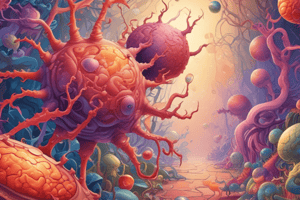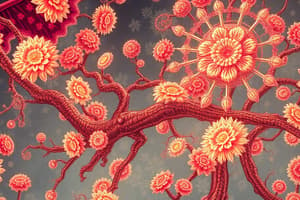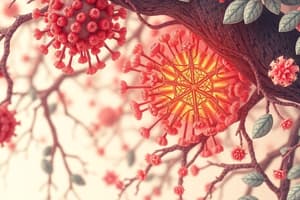Podcast
Questions and Answers
Which factor is NOT associated with promoting tumor growth in cancer?
Which factor is NOT associated with promoting tumor growth in cancer?
- Short-term inflammation (correct)
- Activation of oncogenes
- Escape from immune destruction
- Chronic inflammation
Chronic inflammation is characterized by a short duration and usually resolves within a few months.
Chronic inflammation is characterized by a short duration and usually resolves within a few months.
False (B)
What important discovery did Rudolf Virchow make in 1863 regarding cancer?
What important discovery did Rudolf Virchow make in 1863 regarding cancer?
He discovered leucocytes in neoplastic tissues and connected inflammation to cancer.
The inflammatory response is part of the ______ immune system.
The inflammatory response is part of the ______ immune system.
Match the following terms with their descriptions:
Match the following terms with their descriptions:
Which of the following statements is true regarding the effects of cancer on the immune system?
Which of the following statements is true regarding the effects of cancer on the immune system?
LOF mutations of the inflammatory response can be inherited through germline mutations.
LOF mutations of the inflammatory response can be inherited through germline mutations.
What role do macrophages play in cancer tissue?
What role do macrophages play in cancer tissue?
What is the primary purpose of injecting BCG into tumor sites?
What is the primary purpose of injecting BCG into tumor sites?
The PD-1/PDL-1 system is involved in promoting an immune response against tumors.
The PD-1/PDL-1 system is involved in promoting an immune response against tumors.
What survival rate was achieved when combining surgery with BCG injections for bladder cancer treatment?
What survival rate was achieved when combining surgery with BCG injections for bladder cancer treatment?
In 1909, Paul Ehrlich proposed the idea of __________, suggesting that the immune system monitors tissues for cancer cells.
In 1909, Paul Ehrlich proposed the idea of __________, suggesting that the immune system monitors tissues for cancer cells.
How do tumor cells primarily evade immune detection?
How do tumor cells primarily evade immune detection?
Match the following terms with their functions:
Match the following terms with their functions:
Monoclonal antibodies that target PD-1 or PDL-1 __________ the interaction between these proteins.
Monoclonal antibodies that target PD-1 or PDL-1 __________ the interaction between these proteins.
What is the role of PD-L1 in immune evasion by tumors?
What is the role of PD-L1 in immune evasion by tumors?
What is the role of phosphorylated IkB in the NF-kB pathway?
What is the role of phosphorylated IkB in the NF-kB pathway?
NF-kB can bind DNA and regulate genes involved in tumor suppression.
NF-kB can bind DNA and regulate genes involved in tumor suppression.
Name one function of telomerase in cancer cells.
Name one function of telomerase in cancer cells.
BCL-XL is an __________ factor that enhances cell survival.
BCL-XL is an __________ factor that enhances cell survival.
Match the following target genes with their role in cancer:
Match the following target genes with their role in cancer:
Which protein is essential for NF-kB activation?
Which protein is essential for NF-kB activation?
Chronic inflammation can lead to genetic mutations accumulating in stem cells.
Chronic inflammation can lead to genetic mutations accumulating in stem cells.
What genetic defect causes Familial Adenomatous Polyposis (FAP)?
What genetic defect causes Familial Adenomatous Polyposis (FAP)?
Stem cells can divide __________, producing one differentiating cell and one parental stem cell.
Stem cells can divide __________, producing one differentiating cell and one parental stem cell.
Match the following pathways with their role in stem cell maintenance:
Match the following pathways with their role in stem cell maintenance:
What happens when stem cells do not revert to their resting state after regeneration?
What happens when stem cells do not revert to their resting state after regeneration?
The immune response to infection may also target cancer cells.
The immune response to infection may also target cancer cells.
What is one effect of NF-kB on the cell cycle?
What is one effect of NF-kB on the cell cycle?
NF-kB supports tumors by aiding __________ formation, providing nutrients and oxygen.
NF-kB supports tumors by aiding __________ formation, providing nutrients and oxygen.
Which of the following is a persistent infection associated with an increased cancer risk?
Which of the following is a persistent infection associated with an increased cancer risk?
Chronic inflammation has been identified as a risk factor for around 20% of human cancers.
Chronic inflammation has been identified as a risk factor for around 20% of human cancers.
What is the role of pro-inflammatory cytokines like IL-1Beta and TNF-alpha in cancer?
What is the role of pro-inflammatory cytokines like IL-1Beta and TNF-alpha in cancer?
COX2 is an _____ form involved in inflammation and carcinogenesis.
COX2 is an _____ form involved in inflammation and carcinogenesis.
Match the proteins/enzyme with their functions:
Match the proteins/enzyme with their functions:
Which statement is true regarding COX2 and cancer?
Which statement is true regarding COX2 and cancer?
Regular use of aspirin has been linked to an increased risk of colorectal cancer.
Regular use of aspirin has been linked to an increased risk of colorectal cancer.
Name one inherited genetic defect that can lead to Familial Adenomatous Polyposis (FAP).
Name one inherited genetic defect that can lead to Familial Adenomatous Polyposis (FAP).
NSAIDs, like aspirin, can inhibit _____ and reduce cancer risk.
NSAIDs, like aspirin, can inhibit _____ and reduce cancer risk.
What is one mechanism by which cytokines can contribute to cancer development?
What is one mechanism by which cytokines can contribute to cancer development?
NF-kB is crucial for inflammatory responses and is often overexpressed in many cancer cells.
NF-kB is crucial for inflammatory responses and is often overexpressed in many cancer cells.
What is the effect of chronic inflammation in relation to cancer progression?
What is the effect of chronic inflammation in relation to cancer progression?
Pro-inflammatory cytokines and reactive oxygen species (ROS) can induce _____, leading to mutations.
Pro-inflammatory cytokines and reactive oxygen species (ROS) can induce _____, leading to mutations.
What is the primary role of the IkB protein in relation to NF-kB?
What is the primary role of the IkB protein in relation to NF-kB?
Flashcards
Cancer's Immune Escape
Cancer's Immune Escape
Cancer cells avoid immune destruction by evading the immune system, using inflammatory responses to promote tumor growth.
Cancer's Triggers
Cancer's Triggers
Cancer arises from activated oncogenes (growth-promoting genes) and loss of function (LOF) in tumor suppressor genes (TSGs).
Chronic Inflammation and Cancer
Chronic Inflammation and Cancer
Chronic inflammation, lasting for years, contributes to approximately 20% of human cancers.
Inflammation's Role
Inflammation's Role
Signup and view all the flashcards
JAK-STAT Pathway
JAK-STAT Pathway
Signup and view all the flashcards
ROS Kinase
ROS Kinase
Signup and view all the flashcards
Acute Inflammation
Acute Inflammation
Signup and view all the flashcards
Chronic Inflammation
Chronic Inflammation
Signup and view all the flashcards
BCG Therapy
BCG Therapy
Signup and view all the flashcards
Immune Surveillance
Immune Surveillance
Signup and view all the flashcards
How do tumors escape immune surveillance?
How do tumors escape immune surveillance?
Signup and view all the flashcards
PD-1/PDL-1 System
PD-1/PDL-1 System
Signup and view all the flashcards
Cancer's PDL-1 Trick
Cancer's PDL-1 Trick
Signup and view all the flashcards
Checkpoint Blockade Therapy
Checkpoint Blockade Therapy
Signup and view all the flashcards
CAR-T Cell Therapy
CAR-T Cell Therapy
Signup and view all the flashcards
What is the role of the antigen-binding domain in CAR-T therapy?
What is the role of the antigen-binding domain in CAR-T therapy?
Signup and view all the flashcards
How does chronic inflammation contribute to cancer?
How does chronic inflammation contribute to cancer?
Signup and view all the flashcards
Cytokines
Cytokines
Signup and view all the flashcards
Proliferation
Proliferation
Signup and view all the flashcards
Apoptosis
Apoptosis
Signup and view all the flashcards
Telomerase
Telomerase
Signup and view all the flashcards
Angiogenesis
Angiogenesis
Signup and view all the flashcards
FAP (Familial Adenomatous Polyposis)
FAP (Familial Adenomatous Polyposis)
Signup and view all the flashcards
Dextran Sulfate Sodium (DSS)
Dextran Sulfate Sodium (DSS)
Signup and view all the flashcards
COX2 (Cyclooxygenase 2)
COX2 (Cyclooxygenase 2)
Signup and view all the flashcards
NSAIDs (Non-Steroidal Anti-inflammatory Drugs)
NSAIDs (Non-Steroidal Anti-inflammatory Drugs)
Signup and view all the flashcards
NF-kB (Nuclear Factor kappa B)
NF-kB (Nuclear Factor kappa B)
Signup and view all the flashcards
IkB (Inhibitor of kB)
IkB (Inhibitor of kB)
Signup and view all the flashcards
IKK (IkB Kinase)
IKK (IkB Kinase)
Signup and view all the flashcards
NF-kB's Role
NF-kB's Role
Signup and view all the flashcards
NF-kB's Target Genes
NF-kB's Target Genes
Signup and view all the flashcards
TNF-α and IL-1
TNF-α and IL-1
Signup and view all the flashcards
Cyclin D1 and c-myc
Cyclin D1 and c-myc
Signup and view all the flashcards
Telomerase Activation
Telomerase Activation
Signup and view all the flashcards
BCL-XL
BCL-XL
Signup and view all the flashcards
VEGF
VEGF
Signup and view all the flashcards
IKKβ's Role
IKKβ's Role
Signup and view all the flashcards
Stem Cells and Cancer
Stem Cells and Cancer
Signup and view all the flashcards
Stem Cell Division Types
Stem Cell Division Types
Signup and view all the flashcards
Chronic Inflammation and Stem Cells
Chronic Inflammation and Stem Cells
Signup and view all the flashcards
FAP - Inherited APC Gene Defect
FAP - Inherited APC Gene Defect
Signup and view all the flashcards
Hedgehog and Wnt Pathways
Hedgehog and Wnt Pathways
Signup and view all the flashcards
Cancer's Hidden Seed
Cancer's Hidden Seed
Signup and view all the flashcards
Inflammation and Telomerase
Inflammation and Telomerase
Signup and view all the flashcards
Study Notes
Immune System and Cancer
- Cancer cells avoid immune destruction, escape the immune system, and exploit inflammation to promote tumor growth (cancer hallmarks).
- Cancer arises from activated oncogenes and loss-of-function (LOF) tumor suppressor genes (TSGs).
- Chronic inflammation contributes to approximately 20% of human cancers
Cancer as a Wound That Never Heals
- Rudolf Virchow linked inflammation and cancer in 1863, observing leukocytes in cancerous tissue.
- Research explores the transformative abilities of inflammation in cancer development.
Inflammation in Cancer
- Inflammation is the body's coordinated response to damaged cells or pathogens.
- Inflammation is often beneficial for fighting disease but can contribute to cancer progression in chronic forms.
- LOF mutations in inflammatory response components are less likely to be transmitted to offspring. This suggests a connection between the severity of inflammatory response and fertility.
- Inflammation is part of innate immunity
- Inflammation involves:
- Cytokine/chemokine production (initiates immune response)
- Increased vasodilation (enhances blood flow)
- Leukocyte migration (attracts immune cells)
- Activation of JAK-STAT pathway (triggered by cytokines)
- ROS kinase production by macrophages, linked to tumorigenesis
- Macrophages and neutrophils are common in cancer tissue
- TNF cytokines activate ROS, a tyrosine kinase linked to tumor development
- Cytokine production activates immunity and cancer inflammation
Acute vs. Chronic Inflammation
- Acute Inflammation: Short-term, typically resolves within six months, caused by infections (e.g., HPV, HepB), strong immune response, and no increased cancer risk.
- Chronic Inflammation: Long-term, persists without resolution, caused by persistent infections (e.g., HPV, HBV, HCV, H. pylori), or irritants (e.g., asbestos), weak immune response, increased cancer risk (contributes to ~20% of cancers).
Mechanisms Linking Chronic Inflammation to Cancer
- Immune Cell Actions in Tumors:
- Cytokine secretion: Promotes cell proliferation (immune and cancer cells), inhibits apoptosis, activates telomerase, promotes angiogenesis, and induces DNA damage.
- Supports cell movement, which aids metastasis.
- Tumor Microenvironment Effects:
- Upregulates proliferation/survival pathways
- Enables tissue remodeling and mutation accumulation
- Promotes angiogenesis and metastasis.
- Chronic inflammation directly contributes to cancer by stimulating a response that inadvertently supports tumor growth.
Examples of Chronic Inflammation and Cancer
- Examples of infections linked to chronic inflammation and increased cancer risk include HPV, HBV, HCV, H. pylori, and asbestos exposure.
Inflammatory Response and Cancer Hallmarks
- Chronic inflammation can satisfy several cancer hallmarks by causing long-lasting inflammation, cytokine secretion (promoting immune activation and cell proliferation), inhibiting apoptosis, affecting telomerase for limitless replication, inducing blood vessel formation (angiogenesis), damaging DNA, and enabling metastasis.
Familial Adenomatous Polyposis (FAP)
- FAP is an inherited genetic defect in the APC gene.
- Animal models of FAP show increased colon polyps with germline mutations and when treated with DSS, a colon irritant.
Pro-inflammatory Cytokines (IL-1β, TNF-α, IFN-γ)
- Critical pro-inflammatory cytokines.
- COX enzymes synthesise prostaglandins:
- COX1: Constitutive, involved in normal function.
- COX2: Inducible, upregulated by cytokines, inflammation & carcinogenesis.
- COX2 overexpression is implicated in many cancers (breast, pancreatic, colon). It induces DNA damage, enhances cell proliferation, reduces apoptosis, and increases angiogenesis.
- Inhibiting COX2 can reduce tumor progression.
Rational Therapy: Targeting COX2
- NSAIDs, including COX2 inhibitors, can reduce inflammation and cancer risk.
- Regular aspirin use is linked with a 30% reduced risk of colorectal cancer and adenoma/invasive cancer prevention.
Nuclear Factor kappa B (NF-κB) and Cancer
- NF-κB is a crucial transcription factor involved in inflammatory responses, activated by pro-inflammatory cytokines.
- Overexpression or constitutive activation of NF-κB is common in cancer cells.
- NF-κB regulates cell proliferation and death balance during acute inflammation.
- NF-κB enhances survival by blocking cell death pathways.
- NF-κB activates signaling pathways in both cancer and tumor-associated inflammatory cells.
NF-κB Activation
- NF-κB is held in the cytoplasm by IkB, which masks the nuclear localization signal.
- IKK phosphorylates IkB, causing its dissociation from NF-κB.
- Phosphorylated IkB is degraded, freeing NF-κB to enter the nucleus.
Some NF-κB Target Genes
- TNF-α, IL-1, chemokines (drive inflammation), cyclin D1, c-myc (promote cell division), telomerase (limitless replication), BCL-XL (inhibits apoptosis), VEGF (promotes angiogenesis), TNF-α, IL-1, IL-8 (enhances blood vessel formation).
Rational Therapy: Targeting NF-κB Pathway
- IKKβ is essential for NF-κB activation.
- IKKβ deletion reduces cancer incidence and growth in mouse models.
- Inhibitors targeting IKKβ exhibit potential in chemotherapy and cancer prevention.
Cancer and Stem Cells
- Cancer can originate in committed stem cells or during daughter cell proliferation.
- Stem cell division types:
- Asymmetric: One daughter cell differentiates, one remains a stem cell.
- Symmetric: Two daughter cells become stem cells.
- Stem cells have unlimited replication ability and support tissue regeneration.
- Chronic inflammation and stem cells: repeated cycles of damage and regeneration, increasing the risk of mutation and malignant transformation.
FAP, an Inherited Genetic Defect in the APC Gene
- FAP results from an inherited APC gene mutation.
- Loss of APC function leads to increased cell proliferation and abnormal differentiation.
- In APC-deficient mice, DSS-induced colon inflammation leads to more polyps due to impaired differentiation during regeneration.
Cancer and Stem Cell Genes
- Hedgehog and Wnt pathways are crucial for stem cell self-renewal and are implicated in cancer development.
- Cancer may arise from stem cells that don't return to a resting state after tissue repair.
Hallmarks of Cancer
- Inflammation induces telomerase expression to maintain cell division; immune cells need continual proliferation to fight infection.
- NF-κB promotes cell cycle progression (cyclin D1) and inhibits apoptosis (blocking Rb-E2F), causing uncontrolled cell division.
Tumor Immunology: Early History
- William Coley linked bacterial infections to tumor regression, leading to the concept of immune surveillance and the use of BCG in bladder cancer therapy.
The Balance Between Host and Tumor
- Successful tumors evade immune surveillance by losing their immunogenicity and acquiring anti-immunogenic characteristics.
Checkpoint Blockade: PD-1/PDL-1 System
- The PD-1/PDL-1 system dampens T cell activity preventing autoimmune disease.
- Tumor cells upregulate PDL-1, evading immune detection.
- Blocking the PD-1/PDL-1 interaction with monoclonal antibodies reactivates T cells to fight cancer.
Chimeric Antigen Receptor (CAR)-T Cells
- CAR-T cells are genetically engineered T cells that target specific cancer antigens.
- These cells are effective at recognizing and destroying cancer cells.
Studying That Suits You
Use AI to generate personalized quizzes and flashcards to suit your learning preferences.





